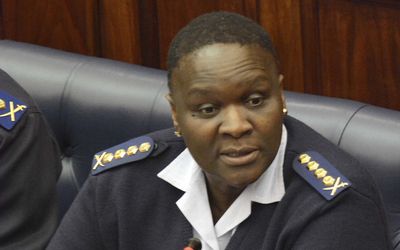WE "CANNOT afford to be at loggerheads with the people we are supposed to serve and protect", national police commissioner Riah Phiyega told Parliament’s portfolio committee on policing on Wednesday. "Mutual respect is crucial."
In the context of the Marikana massacre and a doubling of the number of violent public protests in SA between 2010-11 and 2012-13, from 971 to 1,882, such conciliatory sentiment from the country’s top police officer is clearly welcome. Unfortunately, Gen Phiyega’s words are not generally backed up by police action, nor is there much cause for optimism based on the police’s R3.3bn plan to revamp its public order policing units.
The statement also conflicts with the aggressively defensive attitude Gen Phiyega displayed when testifying before the Farlam inquiry into the police’s handling of the Marikana mine protest, and the denialism that was evident later in her presentation to the police committee when she was asked whether ill-equipped or badly trained public order policing unit members were ever deployed to quell protests.
Gen Phiyega’s response was an unequivocal "No", despite all evidence to the contrary, not least what has emerged from the Farlam inquiry but also numerous other incidents that have been covered by the media in recent years and have caused public outcries, such as the Andries Tatane incident of 2011.
Tatane’s killers were acquitted of murder earlier this year as the policemen involved were wearing identical helmets and could not be individually identified, but television footage showed that undue force was used on a man who was exercising his democratic right to peaceful protest.
At the risk of pre-empting Judge Ian Farlam’s conclusions, it was quite clear from the start of the inquiry that whatever other factors were involved in causing the Marikana tragedy, police incompetence, poor training and inadequate or inappropriate crowd-control equipment were high on the list. If an essential first step in addressing any problem is to acknowledge that there is in fact a problem, it is hard to glean much confidence from Gen Phiyega’s stance.
The emphasis of the public order policing revamp, which is intended to prepare for the 2016 local government elections and for which the police have asked the Treasury to allocate the extra R3.3bn, is apparently on matching the increase in the number of violent demonstrations with a sharp increase in the manpower of public order policing units, from just over 4,700 officers at present to more than 8,700 over the next four years.
More boots on the ground and appropriate expenditure on specialised crowd-control equipment is undoubtedly justified, given the manner in which the units’ capacity has been allowed to drop despite a steady increase in the number of public protests in the past decade — in 1995 there were 11,000 officers assigned to public order policing units. But that cannot be the extent of police management’s response.
There is clearly a need to meet force with force at times — police have a duty to protect the public, and both state and private property, from harm, and it is unacceptable that violence and destruction appear to have become the first resort of politically inspired protesters in some parts of SA. However, it is essential that the principle of the state using the minimum amount of force necessary to restore order be seen to be honoured in the observance rather than in the breach.
The "kill the bastards" approach once advocated by former deputy police minister Susan Shabangu, now minister for women, simply results in a tit-for-tat escalation of violence and makes securing the co-operation of communities to combat ordinary crime exceptionally difficult. Changing that culture demands political buy-in, not throwing money at the problem.

National police commissioner Riah Phiyega. Picture: TREVOR SAMSON
WE "CANNOT afford to be at loggerheads with the people we are supposed to serve and protect", national police commissioner Riah Phiyega told Parliament’s portfolio committee on policing on Wednesday. "Mutual respect is crucial."
In the context of the Marikana massacre and a doubling of the number of violent public protests in SA between 2010-11 and 2012-13, from 971 to 1,882, such conciliatory sentiment from the country’s top police officer is clearly welcome. Unfortunately, Gen Phiyega’s words are not generally backed up by police action, nor is there much cause for optimism based on the police’s R3.3bn plan to revamp its public order policing units.
The statement also conflicts with the aggressively defensive attitude Gen Phiyega displayed when testifying before the Farlam inquiry into the police’s handling of the Marikana mine protest, and the denialism that was evident later in her presentation to the police committee when she was asked whether ill-equipped or badly trained public order policing unit members were ever deployed to quell protests.
Gen Phiyega’s response was an unequivocal "No", despite all evidence to the contrary, not least what has emerged from the Farlam inquiry but also numerous other incidents that have been covered by the media in recent years and have caused public outcries, such as the Andries Tatane incident of 2011.
Tatane’s killers were acquitted of murder earlier this year as the policemen involved were wearing identical helmets and could not be individually identified, but television footage showed that undue force was used on a man who was exercising his democratic right to peaceful protest.
At the risk of pre-empting Judge Ian Farlam’s conclusions, it was quite clear from the start of the inquiry that whatever other factors were involved in causing the Marikana tragedy, police incompetence, poor training and inadequate or inappropriate crowd-control equipment were high on the list. If an essential first step in addressing any problem is to acknowledge that there is in fact a problem, it is hard to glean much confidence from Gen Phiyega’s stance.
The emphasis of the public order policing revamp, which is intended to prepare for the 2016 local government elections and for which the police have asked the Treasury to allocate the extra R3.3bn, is apparently on matching the increase in the number of violent demonstrations with a sharp increase in the manpower of public order policing units, from just over 4,700 officers at present to more than 8,700 over the next four years.
More boots on the ground and appropriate expenditure on specialised crowd-control equipment is undoubtedly justified, given the manner in which the units’ capacity has been allowed to drop despite a steady increase in the number of public protests in the past decade — in 1995 there were 11,000 officers assigned to public order policing units. But that cannot be the extent of police management’s response.
There is clearly a need to meet force with force at times — police have a duty to protect the public, and both state and private property, from harm, and it is unacceptable that violence and destruction appear to have become the first resort of politically inspired protesters in some parts of SA. However, it is essential that the principle of the state using the minimum amount of force necessary to restore order be seen to be honoured in the observance rather than in the breach.
The "kill the bastards" approach once advocated by former deputy police minister Susan Shabangu, now minister for women, simply results in a tit-for-tat escalation of violence and makes securing the co-operation of communities to combat ordinary crime exceptionally difficult. Changing that culture demands political buy-in, not throwing money at the problem.

























Post a comment